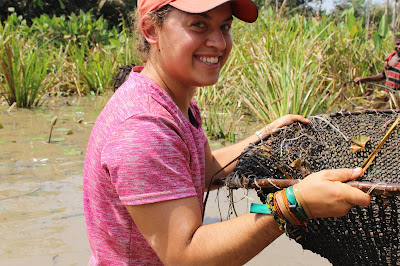I tried fishing! Did I catch anything? Read on!
My blog is getting even more famous with the local rags. Detour to Duoplay proudly proclaims,
The
next day after I arrived in Liberia was a Monday, so Milea took me to her
school where she teaches math and chemistry. We got to school at 7:30am, when
the other students and teachers were also supposed to show up. Most of the
teachers weren’t coming to school because the government stopped paying them, among
other complications, and a lot of kids were absent too because their teachers
weren’t there to teach them. Milea wouldn’t be deterred, though, and came to a
relatively empty school to teach. I sat in as she taught 10th, 11th,
and 12th grade math and chemistry classes. Props to her for teaching
things that, to my knowledge, she had little to no interest in before. She was pretty
good at teaching, too! Her classes were very small, the smallest being 6 people
in 12th grade and the largest at 24 in 10th grade.
Teaching in Liberia is more akin to teaching in the US, with no going around
and marking of classwork that sucks up most of the class time, as is standard
practice in Lesotho.
Chairman of the (chalk)board
The awesome 10th graders
A 12th grader answering problems up at the front
After
school, we decided to go fishing. Milea had seen people walking around with
nets and had been invited to go fishing before, but today would be the day we actually
tried it. We followed some kids with nets to this swampy area. We kicked off
our shoes and stepped in, the mud squishing through our toes. We watched the
others and tried to copy the fishing technique of reaching down to swirl up mud
to get the fish out and moving. With the water up to our waists, we tried a few
times to use the nets to scoop up fish from the water, with no luck. It was
really fun nonetheless.
Lots of people fishing down there
Jamama showing Milea the ropes
Nope, no fish in there
Milea tries with the net
Thumbs up for fishing
Milea
had some other experience with planting rice in a swampy farm a few months
earlier. People plant and eat a lot of rice here. They grow it in the swamp,
harvest it, dry it, beat it to get the grains out, and swirl and toss it in a circular
woven tray to get the chaff out. It’s a lot of work! It really made me realize
how easy I had it with easy access to grocery stores in the US.
After we got back from the swamp
and our muddy pants had dried out, we were gifted some little catfish-looking
fish by Milea’s neighbor. Then we both realized that neither of us actually knew
how to gut/prep fish, so when one of her child stalkers, Jamama, came to eat
rice and soup with us, we just gave her the fish. We were telepathically
telling her, “Shh, don’t tell the neighbor lady who gave them to us…” Yeah, we’re
both not really fish-loving people.
Side note: A big
staple in Liberian cuisine is rice and “soup,” which is more like a
sauce/stew/gravy that goes over the rice. It can be made out of lots of things,
including peanuts, fish, bitterball (a nasty, bitter squash), fish, beans, fresh
or dried meat, mashed up cassava greens, and almost always has copious amounts
of hot pepe and diarrhea-inducing red oil derived from palm nuts.
After that, my
out-of-shape butt followed a much-more-in-shape Milea on a run down the dirt road.
Milea was like whoosh down the road and I was like yup…I haven’t run since I
had access to a beach in South Africa. Except for when I broke down and got
some cheap shoes in Zambia, the only shoes I had to my name for the past four
months were my Chacos sandals, so running wasn’t exactly on my daily schedule. It
was pretty fun to get out on the road, though, seeing the red dirt road in
front of me contrasting with the green jungley trees to either side. We were in
the midst of the dry season, and boy was there dust everywhere. The reddish
orange dust had settled on every leaf on the plants lining the road, and you
couldn’t help but squinch your eyes to avoid all the flying dust when a
motorbike buzzed by.
The next day at
school, Milea was happy to let me teach her classes for the day. There were no
chemistry classes that day, only math, so I felt in my element. Unlike in
Lesotho where they very ineffectively mix up all the math topics in each year,
here they actually do one math topic/subject per year (geometry, trigonometry,
etc.). Her students ranged in ages from the normal young-teenage age to fully
grown adults, many with kids, and a few who actually brought their kids to
school out of necessity sometimes. I did miss teaching, but after I was done, I
didn’t miss how much it tires you out by the time the school day is over. I
went home and ate some lunch while Milea stayed to have her reading club after
school. She has a few motivated students who are really pumped about getting
their reading levels up, which is awesome, and it’s great that she gives them a
chance to practice by joining this club.
The outside of the school, complete with newly-built fences to keep children in and goats out
Coming soon: I get
out of Duoplay and visit the big weekly market, with many market discoveries to
be made!






































